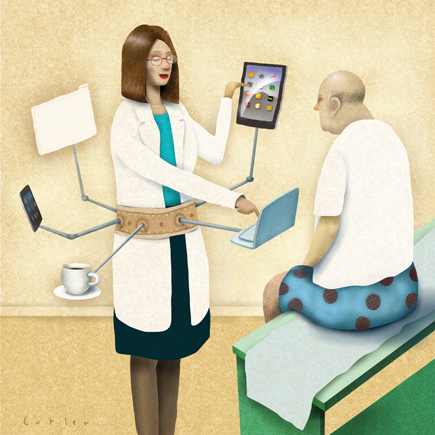April 2012

Mobile devices offer advantages, challenges
Internists are piecing together technology to improve their practice management, but too many pieces are more of a puzzle than a picture. All the new devices ultimately need to lead to better care, the experts urge.
New drugs could improve anticoagulation rates
Dabigatran and rivaroxaban spare patients the need for regular blood checks, but warfarin is less expensive and has an antidote to reverse bleeding, if needed. Does the convenience of the new generation of drugs and the potential to increase compliance with therapy outweigh their downsides?.
Learn how to plan a medical volunteering trip overseas
If your idea of a stimulating vacation involves unsafe destinations, bribing foreign officials for a medical license and practicing resource-limited hospitals, then there's an organization willing to set it all up for you. (You also get to meet kings and see beautiful scenery.).
Warning on PPIs and C. diff, contraceptive pill mixup
Recalls, warnings, approvals and other regulatory news.
Decisional conflict: Balancing risks, benefits for each patient
A 73-year-old man struggles with the decision whether to consider anticoagulation for atrial fibrillation, a “decisional conflict” that affects many trying to balance risks and rewards of medical treatments. Doctors should help the patients choose, but then abide by that decision.
Transitions don't mean a loss of continuity for ACP's mission
As ACP's outgoing president contemplates the upcoming change of leadership, she realizes that while the people may change, the organization still requires its leaders and its members to continue.
Haggling over health care reform is like a children's game
Health care reform has made progress with internists already seeing bonus reimbursement in their offices. But the Affordable Care Act is about to run smack into the Supreme Court, and what happens there could result in any range of outcomes.
No such thing as ‘one fits all’ for physicians and mobile devices
Technological devices can make physicians lives easier, but integrating them can be difficult. Physicians report on how they make the many mobile devices work in their offices.
Letters to the Editor
Readers submit their thoughts on using scribes and paying for medical school.
CMS delays ICD-10, offers new overpayment options
The Centers for Medicare and Medicaid Services heard the primary care community's complaints and have delayed ICD-10 implementation until further notice. The agency did, however, launch several new tactics in order to collect overpayments.
Distributing pay for performance
Once a practice receives pay-for-performance bonuses, how should they be distributed? Do they go to the treating physicians, the entire practice or some kind of hybrid? There options aplenty to consider.
ACP conducts Annual Business Meeting
All members are encouraged to attend ACP's Annual Business Meeting to be held during Internal Medicine 2012.
Chapter awardees
Chapters honor Members, Fellows, and Masters of ACP who have demonstrated by their example and conduct an abiding commitment to excellence in medical care, education, research, or service to their community, their chapter, and ACP.
MKSAP Quiz: Pleuritic chest pain
A 34-year-old woman is evaluated for sharp intermittent pleuritic chest pain that has persisted for 1 week. The pain is worse when she lies down in the supine position. She has had no fever, chills, cough, or weight loss. She had acute viral pericarditis 6 months ago that was treated initially with ibuprofen, but when she failed to respond after 3 days, a 10-day tapering dosage of prednisone was instituted, leading to resolution of clinical symptoms.
